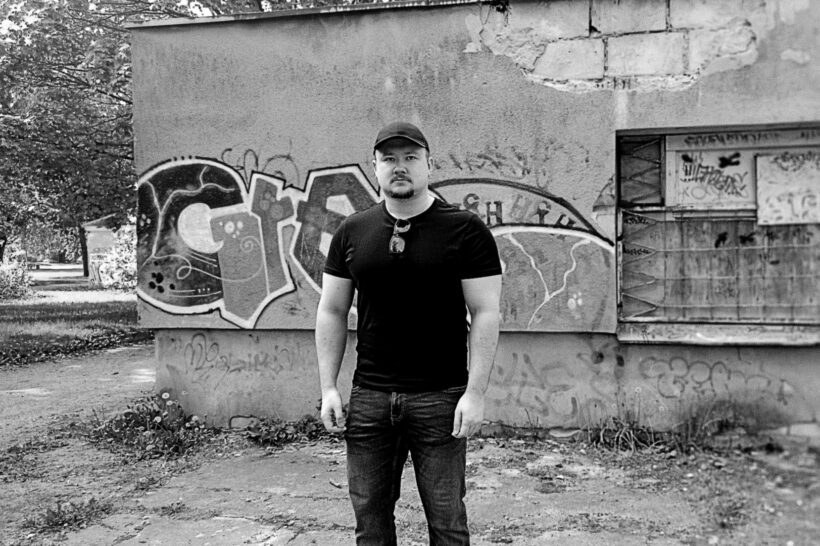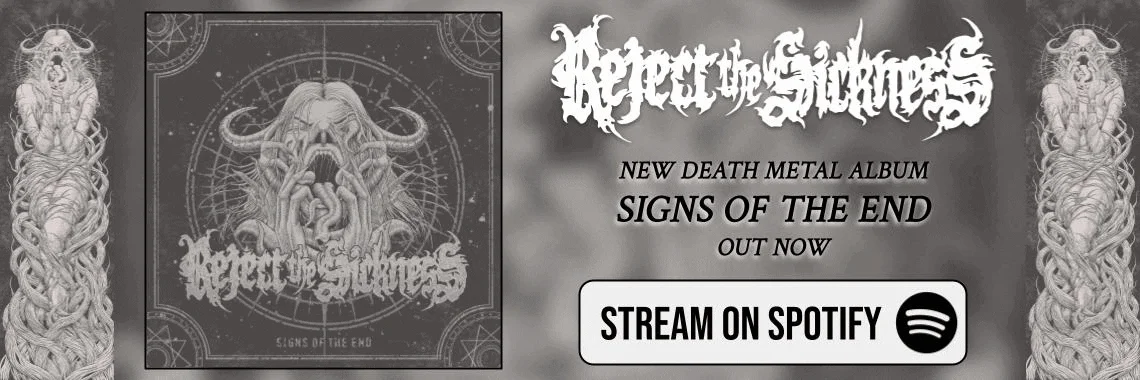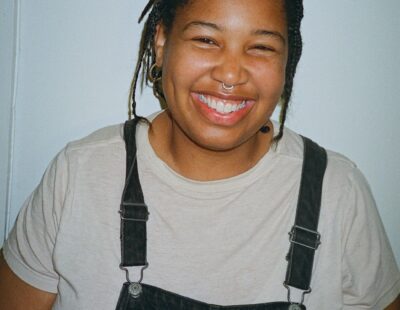
Estonia’s Thunraz is a prime example of one of those idiosyncratic treasures that we occasionally stumble across while sifting through the rubble of social media (man, talk about a couch-fort in the ol’ oubliette). Discovering an act that arouses real emotion and legitimately provokes the imagination with no swaggering pundit or eggheaded connoisseur in sight to qualify or otherwise chaperone the experience is always tremendously liberating; you simply feel more directly aligned with the deliciously haunting and bewildering authority of truly underground music. And there’s plenty to be righteously bewildered and properly haunted by within the Thunraz catalog. Whether it’s Borderline’s subversive DM by-way-of noise rock blues, the “walls closing in,” slantways death/doom of Revelation, or the paradoxically catchy yet discreetly progressive extremity of Hinterland, Thunraz never fails to remunerate its audience for their precious time, (the mechanized, early Godflesh-esque requiems of the Quarantine EP are likewise, tres fucking worthy.)
Becoming friendly with Thunraz’s governing-ghoulie Madis Jalakas accorded me early access to the band’s upcoming November 22 release, Incineration Day—a sepulchral, avante-sludge gauntlet—and thus a full blown interview was warranted, (particularly given the disconcerting news that the whole project may be put on ice for the foreseeable future). So is Thunraz actually pulling stakes and setting off for good or are we just taking a breather here? Why now, directly on the heels of a properly crippling new record? Ah, but I’m getting ahead of myself. Let’s fork over the talking stick to Madis and find out for ourselves.
BALTIC GLOOM
Decibel: Let’s start by talking a little bit about your home in Tallinn, Estonia and how your environment may, (or may not,) have impacted your music. Tell me about who or what initially inspired you to create Thunraz and how well do you feel that your music fits in within Tallinn’s metal scene?
Madis Jalakas: I actually know relatively little about the Estonian metal scene as such and don’t follow any local bands closely, (I would imagine we’d be influenced by Finland given the proximity, but I honestly couldn’t tell you beyond that.) My main musical influences are all bands I found through exploring various discussion forums and review sites in the early-to-mid-’00s.
Do you consider your music to be evocative of your homeland in any specific fashion?
Physical location certainly can add a character to the sound of a band, but I would say the only way this place has influenced my music is through its impact on my psyche. Thunraz is evocative of somebody who grew up in the post-Soviet ’90s, experiencing intermittent poverty and various forms of mental and physical abuse.
Okay, so going back a little further, what were your earliest musical fascinations and epiphanies and what initially inspired you to begin creating your own music? Was guitar the first instrument that you gravitated towards?
The first music I remember loving was the song “Personal Jesus” by Depeche Mode and a dance remix of “Living on My Own” by Freddie Mercury. I wore those tapes thin! And guitar was the only instrument I was able to practice in my apartment, (my initial preference was actually for drums). After a few months of guitar lessons in first grade, I’d largely abandoned the idea [of becoming a musician]. There was just no way to do what I wanted and no way to find new sources of inspiration until we finally got an internet connection several years later. After that, it was probably the band Botch that made me want to pick up the guitar again. Years of intermittent practice followed until I realized that it was now quite easy to produce music at home. Certain factors in my personal life provided ample inspiration for lyrical content…
For the most part, Thunraz has operated as a solo project up until 2023’s Revelation album. Was that due to an intention that the band act as a vehicle to execute your personal artistic vision without having to compromise with additional personnel or did it more come down to artistic incompatibility with your direct peers?
A mixture of both. I felt like I’d wasted enough time and had too much to say to wait around for other people.
And how do you feel that primarily operating as a solo project has impacted Thunraz’s evolution in addition to your own progression as a songwriter? There must be objective pros and cons associated with that approach, right?
Working this way has freed me to fully explore my creative whims, (although I’m not opposed to collaborations, per se; it simply has to be the right fit). Other people can sometimes bring a fresh perspective; I don’t see any cons to either approach so long as the results are satisfying.
You’ve been working with American drummer Sean Rehmer since last year’s excellent Borderline record. How did that collaboration come about?
I found Sean through one of his drum covers that he posted on Facebook. I noticed he’d covered [not only] bands like Gorguts and Godflesh but also Deftones and Sunny Day Real Estate, (which seemed like a pretty rare thing). Hearing his band Dejecter convinced me that he could write interesting drum parts as well.
And what’s your working process like? Do you simply present Sean the complete tracks or is he involved at all in their arrangements?
I send him the complete guitar tracks and he comes up with his parts mostly on his own. I’ve given input a few times. But the first track I sent him he completely nailed on his first try, so further collaboration was definitely warranted; haha.
You have an intriguing and genuinely peculiar riffing style and melodic sensibility, (for example, I’d describe Borderline’s “Reborn to Die” as lying somewhere on the unlikely spectrum connecting the Jason Newsted/VoïVod era to Today is the Day). What do you attribute your distinctive technique to?
The main thing is that I don’t separate different sounds/genres into different categories in my head. Everything is on the table, you know? Voïvod and Today Is the Day are among my favorites and [they] also draw from some pretty disparate sources. As far as my approach to the guitar itself, it’s mainly from the way Okoi [Thierry] Jones [Bölzer guitarist/vocalist] would play rhythm and lead parts together. I try to keep all the layering within the riffs themselves.
Can you expand on what you found most informative in regards to Okoi Jones’s technique?
It was just the idea of a two-piece that sounded huge. The basic formula is to think about how to construct interesting songs with the least amount of tools available. What can I do with this riff if I’m not gonna record a lead over it? You end up with a kind of minimalist maximalism – I find that creatively inspiring. Obviously, Thunraz bears little resemblance to Bölzer musically, but that was and continues to be my approach to the guitar…

Your 2023 album Borderline felt more overtly personal and more grounded in interpersonal conflicts and urban decay than its most direct predecessor Revelation, (also released in 2023). How does the newest record reflect upon your personal life and experience by comparison?
Borderline was definitely my most grounded and most directly personal work overall. By contrast, Incineration Day is more about people I’ve known and the world in general.
And while we’re on the topic of Borderline, Thunraz was insanely prolific in 2023. What led to that spasm of productivity?
2023 was a terrible year for me… It just so happens that any time I feel really terrible I pick up the guitar. Cliched answer, but it really is an escape; it’s a place for the frustration to go. (Also, a lot of the material on Borderline was already written long beforehand, so it was only a matter of finishing what I started.)
Thunraz is largely rooted in death metal sensibilities but it also exhibits doom, noise, industrial and post hardcore sensibilities along with a very subtle but undeniable hooky/catchy panache. The overall effect is extremely approachable but I think it’s interesting how the emphasis of all of those disparate elements will shift slightly from release to release. How intentional are those stylistic fluctuations and what level of acceptance for Thunraz’s eccentricities have you experienced within the metal community, (both in Estonia and abroad)?
Borderline was intentionally more immediate because that’s what I was in the mood for. Things will shift based on where I’m at in my life and what I’ve been listening to. As for acceptance, honestly I get such a range of opinions on my stuff that it’s hard to come to any kind of definitive conclusion. The people who like the same music as me seem to get it almost universally. The ones who don’t, either think it sounds “wrong” and question whether I know what I’m doing, or, (even more hilariously), dismiss it as plain-old, boring death metal. Maybe they hear the growls and blast beats and ignore the rest. Who knows? I’m glad that some people get it, whether at home or abroad. There are some fans.
Many of Incineration Day’s lyrics read like they have a distinct, socio-political focus. For example, on the track “Fragile Automata” you state, “I’ll always hate this place for what it does to the delicate ones and [also] myself for the times I turned away”. Elaborate on that lyric.
The whole record is about what this world does to the people who are, for a lack of better word, “sensitive”. And I don’t mean that like it’s a weakness. I mean people who notice, feel, see, and think things that others do not. Many of them are artists themselves or creative in some other way, but they also find it hard to put up with the various injustices in the world, whether personal (committed against them by others) or impersonal. But I’d argue that nothing is truly impersonal. We’re all connected, just not always in obvious ways. That lyric is me owning up to my own failure to save some people I cared about deeply. And yes, you can save people. The idea isn’t to succeed, the idea is to try.
And what is the eponymous Incineration Day?
An “Incineration Day” is something I wish for when nobody seems to care, (which I’m finding to be the case increasingly).
“Spiritual Self Surgery” is an absolutely grueling, (at points, almost abstract) death/doom ordeal; it’s a haunting way to close out the new record. Likewise, the lyrics are arguably the most righteously scathing on the record. Can you elaborate a little about the track in general and what the “surgical exercise” of the title alludes to?
Oh, that’s just a little song about cutting out one’s tongue to prevent the utterance of words that inevitably fall on deaf ears, (thereby saving oneself from the pain of being misunderstood yet again). I found it fitting to end the album on that note since I intend to go on an extended hiatus. There are plenty of [my] records now for people to ignore. Just kidding; enjoy my seven years of hard labor.
What are you hoping to get out of your planned hiatus? I ask because you mentioned that Thunraz and creating music have often functioned as a release valve for you during times of stress and hardship and yet you’re taking a leave of absence on the eve of the release of your fourth full length, (and I doubt it’s because you no longer require that catharsis—correct me if I’m wrong).
I just feel like I’ve been drinking from the same poisoned well for too long at this point. The initial idea for the project was to explore philosophical themes that I was fascinated by at the time but when it came down to writing the actual lyrics, I wasn’t feeling anything I was saying. I don’t care enough about Nietzsche, Camus, Jung, and evolutionary psychology to scream about it, (although aspects of each do show up here and there). The emotional core for Thunraz came with the death of my friend Jessica. The day I found out that she had died is when I wrote the first lyrics I actually “felt.” That ended up being the song “Drudge” off of the Bloodstone ep. In a way, I’ve come full-circle seeing as Incineration Day touches on similar themes. I’ve watched a lot of people wither, die, or go crazy. And maybe we all have [dealt with that] but for whatever reason I find it particularly difficult to move on. I suppose that was the other benefit of doing this project; the self-knowledge gained. It’s almost like I didn’t know what I truly cared about until I forced myself to go through the process of making a record several times. As for my planned break, there are certain things I’ve been neglecting that require prolonged, focused work.
Okay, brass tacks: Do you fully intend to reboot Thunraz following this hiatus or is there significant potential that Incineration Day is the project’s closing statement?
Only time will tell if there is anything further to say with this project but if Incineration Day remains the final Thunraz record, I’d be okay with that. [One way or the other] it’s definitely a conclusion to its current manifestation.
This interview will be airing roughly around the time that Decibel magazine’s annual Top 40 Albums of the Year is published. In that spirit, (outside of Incineration Day), what are your top five records of the year?
I didn’t have time to listen to many records this year, but these are all absolute winners:
1. Convulsing, Perdurance
2. Chat Pile, Cool World
3. Pyrrhon, Exhaust
4. Walk Through Fire, Till Aska
5. Hull of Light, Gilded Liminal Shrines






